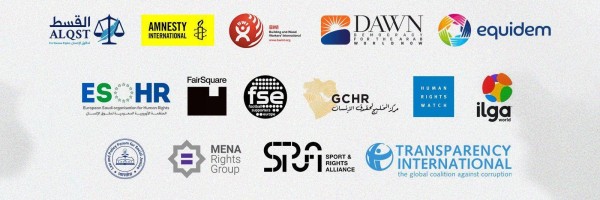Over the past six months, in the run-up to the G20 summit on 21 and 22 November, international pressure has been building on virtual host Saudi Arabia to bring in genuine social and human rights reforms. ALQST has been running a campaign to highlight how the Saudi authorities violate a variety of the most basic human rights, and in collaboration with partner NGOs we have mobilised people around the world to urge G20 participants and governments to place human rights at the centre of all G20 discussions.
Large parts of the international community have been paying attention, and it is vital now to step up the pressure on the Saudi authorities to comply with international human rights standards and allow real structural reform.
We were not alone in drawing attention to the hypocrisy and absurdity of the Saudi authorities hosting interactive dialogues on the role of civil society and women’s empowerment while the system of male guardianship continues to negatively impact all aspects of women’s lives, and the absence of an independent civil society makes any such discussions meaningless. In March 2020, ALQST joined more than 220 civil society organisations from around the world in calling for a boycott of the G20 civil society engagement process.
To offer Saudi activists a platform to raise their concerns in the context of the G20, and to provide a channel for their voices to be integrated into the official G20 process, ALQST held a shadow G20 workshop on 2 September 2020, bringing together Saudi activists with Members of the European Parliament (MEPs) to discuss issues of women’s and human rights in Saudi Arabia. The concrete recommendations produced in this workshop were passed on by the MEPs to EU representatives and shared widely with other participants and members of the G20.
The Urban 20 summit of mayors of G20 cities took place virtually on 2 October, coinciding with the second anniversary of the killing of journalist Jamal Khashoggi in the Saudi consulate in Istanbul. In response to the NGOs’ campaigning, the mayors of London, Paris, New York and Los Angeles pulled out of the U20 summit of global city leaders.
A few days later, the European Parliament voted by an overwhelming majority to downgrade its attendance at the November G20 summit in Saudi Arabia over human rights concerns, and to call for sanctions. A petition organised by ALQST and co-signed by 65 MEPs further underlined the point.
Similarly, 45 members of the US Congress called on Secretary of State Mike Pompeo and the Trump administration to drop out of the G20 summit, and a motion in the UK Parliament also raised grave human right abuses in the context of the G20, conveying the message loud and clear that the Saudi authorities can no longer expect to carry on business as usual.
Pressure has been increasing at the United Nations too, with a third joint statement on the human rights situation in Saudi Arabia, co-signed by 33 UN member states, demanding genuine and structural rights reform. Saudi Arabia also lost its bid for a further term on the UN Human Rights Council, signalling that the international community will no longer tolerate the kingdom’s serious rights abuses.
Meanwhile Saudi activists, academics and intellectuals have launched the Saudi People’s Vision for Reform, which lays out a clear roadmap of the social and human rights reforms needed to enhance the country’s strengths and capabilities, and offers a great alternative to the top-down Vision 2030 that fails to incorporate any human or social component of reform.
All these things demonstrate that large parts of the international community are not buying into the Saudi authorities’ extensive PR efforts to whitewash their image. Instead, the world is becoming increasingly vocal about their various and grave human rights abuses and demanding genuine reform and accountability. So it is vital that we now build on the many initiatives pursued ahead of the G20, and not only maintain but increase the pressure on the Saudi authorities to comply with international human rights standards and allow for real structural reform.




